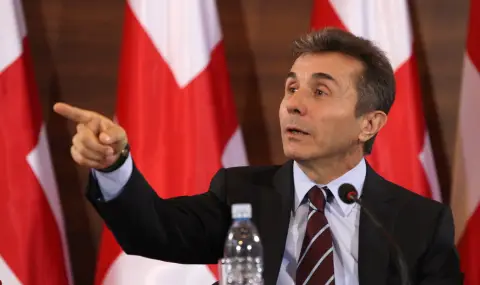Georgia's savior. Russia's pivot. A philanthropist. Oligarch. Bidzina Ivanishvili is called by all these definitions and even more.
The billionaire, who is Georgia's richest man and founder of the ruling party, is rarely seen in public, or if he is, it's behind bulletproof glass. Nevertheless, his presence is strongly felt in the small European country, wandering between Russia and the West, and in the elections that could determine its fate.
Ivanishvili can oversee downtown Tbilisi from his imposing residence, which towers over the Georgian capital and includes a helipad. Ivanishvili also has some exotic hobbies, such as raising sharks and zebras and collecting rare tree species.
The 68-year-old billionaire is considered by many of his friends and foes to be the most powerful figure in Georgia, or a gray cardinal, even though he has not held public office in more than a decade. He described Saturday's election as an existential battle to prevent the “Global War Party” of the West to involve Georgia in a destructive conflict with its former master Russia, as he says is happening in Ukraine.
„Georgia and Ukraine were not allowed to join NATO and were left outside," Ivanishvili said during one of his rare public appearances at a pro-government rally in Tbilisi on April 29.
„All such decisions are made by the Global War Party, which has a decisive influence on NATO and the European Union, and which sees in Georgia and Ukraine only cannon fodder,”, he said.
Although a majority of Georgia's population of 3.7 million supports rapprochement with the West by joining the EU and NATO and generally distrusts Russia, polls show that Ivanishvili's messages appeal to many, who want the country to avoid Ukraine's involvement at all costs.
Memories of the 2008 war with Russia over the Moscow-backed separatist regions of South Ossetia and Abkhazia, which lasted five days and ended in defeat for Georgia, have not yet faded.
Oleg Machavariani's home is only ten kilometers from South Ossetia. The 75-year-old retired civil servant fears that history will repeat itself if the staunchly pro-Western and anti-Russian opposition returns to power.
„I think the first thing that will happen is that we will be involved in a war," he says.
Ivanishvili's ruling Georgian Dream party is on course to win the election, polls show, although it is expected to lose votes nationally compared to the 2020 election, when it won a slim majority in parliament.
Ivanishvili, who was heavily pro-Western during his party's first decade in power, was not reached by Reuters for an interview, but “Georgian Dream” stated that it remains committed to integration with the West and a pragmatic policy towards neighboring Russia.
Reuters interviews with several former close associates of the billionaire, as well as voters from both ends of the political spectrum and Georgian experts, provide insight into the influence the mysterious tycoon wields in the South Caucasian country.
„The concentration of power is enormous“
Allies of Ivanishvili in the upper echelons of power speak of him with almost messianic rhetoric.
„When people lost all hope forever, a man appeared who gave it back to them,", two-time former prime minister Irakli Garibashvili said of Ivanishvili's first election victory in 2012, after which he became prime minister for a year.
Garibashvili was among a group of Georgian officials who showered honorary party chairman Ivanishvili with praise at a rally in September when, unlike the tycoon, they were not hiding behind bulletproof glass. Current Prime Minister Irakli Kobakhidze said Ivanishvili sacrificed everything, including his well-being, to protect Georgia from its political enemies.
Ivanishvili spent much of the 1990s in Russia, founding banking, metallurgical and telecommunications companies and getting rich in the chaotic atmosphere after the collapse of the Soviet Union.
His political rivals paint him as a power-hungry oligarch who wields dangerous influence over the former Soviet republic of Georgia. Many call his party the “Russian Dream”. Others define him as a creature of the Kremlin, without providing evidence of this.
„He turned Georgia into a private company in which he has 100 percent of the shares,” said Gia Huhashvili, a former top political adviser to Ivanishvili who helped him found “Georgian Dream” before there was a rift between them in 2014, when Khukhashvili accused the billionaire of exerting influence behind the scenes.
Giorgi Gakharia, who was the prime minister of “Georgian Dream“ in the period 2019-1921 and resigned after accusing Ivanishvili of interfering in the governance of the state, repeated these criticisms.
„The concentration of power is huge”, said Gakharia, who now leads the party “For Georgia” - one of the four main blocs of the divided Georgian opposition in the October 26 elections.
„There is no longer a single independent institution in this country,”, Gakharia said, adding that the heads of the Georgian Central Bank, Election Commission, Audit Chamber and Judiciary report to the tycoon.
„All these people are directly related to Ivanishvili. They are loyal to him”, said Gaharia.
Georgia's Ministry of Justice, the Audit Office and the Central Bank did not respond to Reuters requests for comment. The Electoral Commission said that the allegations that he was being influenced by the ruling party were “Baseless and harmful to the integrity of the electoral process”.
180-degree turn in rhetoric about the West
After the start of the full-scale Russian invasion of Ukraine in February 2022, Ivanishvili almost completely reversed Georgia's long-standing course of rapprochement with the West, which he himself defended as prime minister between 2012 and 2013.
This year the government of “Georgian Dream“ pushed through the “foreign agent” law, which requires organizations receiving more than 20 percent of their funding from abroad to register as such, and limited the rights of the LGBT community. These decisions were praised by Moscow and condemned by critics as anti-democratic and Russian-inspired.
These steps, along with Tbilisi's increased anti-Western rhetoric, led to the suspension of some US and EU aid to Georgia and the freezing of the country's application for membership in the bloc.
